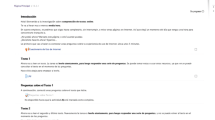Abstract
Important tasks performed in hypertext such as information retrieval or comprehension of texts are strongly related to memory process functioning, more exactly, to working memory and long term memory functioning. These two processes work in a peculiar way for deaf users. In this document, we discuss the validity of the existing web accessibility guidelines for people with deafness in contrast to our own empirical work in the web environment with these kinds of users, and according to literature reviews concerning memory process in the deaf and in hypertext interaction.
Access this chapter
Tax calculation will be finalised at checkout
Purchases are for personal use only
Preview
Unable to display preview. Download preview PDF.
Similar content being viewed by others
References
Emiliani, P.L.: Special needs and enabling technologies: and evolving approach to accessibility. In: Stephanidis, Constantine (ed.) User interfaces for all, pp. 97–113. Lawrence Erlbaum Associates, Mahwah (2001)
Marschark, M.: Cognitive functioning in deaf adults and children. In: Marschark, M., Spencer, P.E. (eds.) Oxford handbook of deaf studies, language, and education, pp. 464–477. Oxford University Press, New York (2003)
Fajardo, I., Cañas, J.J., Antolí, A., and Salmerón, L.: Accesibilidad Cognitiva de los Sordos a la Web. 3 Congreso Internacional Interacción’ 2002, Madrid (2002)
Kim, H., Hirtle, S.C.: Spatial metaphors and disorientation in hypertext browsing. Behaviour and Information Technology 14(4), 239–250 (1995)
Rollman, S.Y., Harrison, R.: A comparison of deaf and Hearing subjects in Visual Nonverbal sensitivity and Information 21. Processing. American Annals of the Deaf 141(1), 37–41 (1996)
Leybaert, J., Alegria, J.Y., Morais, J.: On automatic reading processes in the deaf. Cahiers de Psychologie Cognitive 2(2), 185–192 (1982)
Web Accessibility Initiative –WAI Web Content, Accessibility guidelines 1.0 Available at (1999), http://www.w3.org/WAI/
Seeman, L.: Inclusion Of Cognitive Disabilities in the Web Accessibility Movement. In: Presented at the 11th international World Wide Web Conference, Honolulu, Hawaii, USA (2002)
Emmorey, K.: Language, Cognition and the Brain. Insights from sign language research. LEA, New Jersey (2002)
Toms, E.G.: Understanding and facilitating the browsing of electronic text. International Journal of Human Computer Studies 52, 423–452 (2000)
Kintsch, W.: Text comprehension, memory, and learning. American Psychologist 49, 294–303 (1994)
Astleitner, H., Leutner, D.: Learning strategies for unstructured hypermedia, A framework for theory, research, and practice. Journal of Educational Computing Research 13, 387–400 (1995)
Rouet, J.-F., Passerault, J.-M.: Analyzing learning hypermedia interaction: An overview of on line methods. Journal of Instructional Science 27, 201–219 (1999)
Fajardo, I., Cañas, J.J., Salmerón, L. Abascal, J.: Working Memory Architecture and its Implications for Hypertext Design: Insight from Deaf Signer Users Research (manuscript in revision) (2003)
Fajardo, Cañas, Salmerón, Abascal: Distancia Semántica e Interacción con Interfaces Web Gráficas. Contribution accepted for being presented in the V Congreso Interacción Persona Ordenador, 3 - 7 de mayo de 2004 Universitat de Lleida, Spain (2004)
Clar.: Building accesible websites. New Readers, Indianapolis (2002)
McDougall, S., Bruijn, O., Curry, M.: Measuring symbol and icon characteristics: Norms for concreteness, complexity, meaningfulness, familiarity and semantic distance for 239 symbols. Behaviour Research Methods, Instruments & Computers 51(3), 487–519 (1999)
Foltz, P.W.: Comprehension, Coherence, and Strategies in Hypertext and Linear Text. In: Rouet, J.F., Levonen, J.J., Dillon, A., Spiro, R. (eds.) Hypertext and Cognition, pp. 109–136. LEA, New Jersey (1996)
Salmerón, L., Cañas, J.J. Fajardo, I., Gea, M.: Expertise and Semantic Grouping on Hypertext Information Retrieval Tasks (manuscript submitted for publication) (2004)
Author information
Authors and Affiliations
Editor information
Editors and Affiliations
Rights and permissions
Copyright information
© 2004 Springer-Verlag Berlin Heidelberg
About this paper
Cite this paper
Fajardo, I., Abascal, J., Cañas, J.J. (2004). The Role of Working Memory and Long Term Memory in Deaf Users’ Hypertext Navigation: Review of Guidelines for Web Accessibility. In: Stary, C., Stephanidis, C. (eds) User-Centered Interaction Paradigms for Universal Access in the Information Society. UI4ALL 2004. Lecture Notes in Computer Science, vol 3196. Springer, Berlin, Heidelberg. https://doi.org/10.1007/978-3-540-30111-0_27
Download citation
DOI: https://doi.org/10.1007/978-3-540-30111-0_27
Publisher Name: Springer, Berlin, Heidelberg
Print ISBN: 978-3-540-23375-6
Online ISBN: 978-3-540-30111-0
eBook Packages: Springer Book Archive




